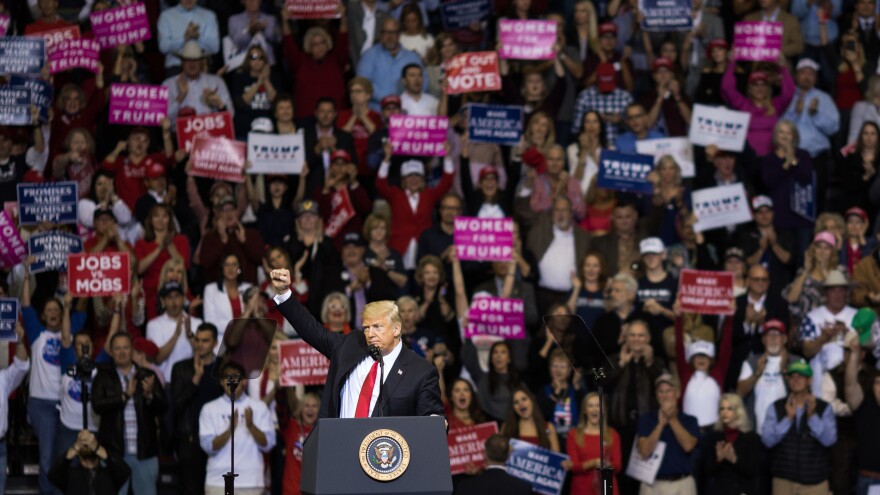President Trump has a penchant for breathing new life into expressions with troubled pasts, like "America first" and "enemy of the people." It's not likely his uses of those phrases will survive his presidency. But he may have altered the political lexicon more enduringly at a Houston rally two weeks before the elections, when he proclaimed himself a "nationalist" and urged his supporters to use the word.
Given Trump's policies on immigration, trade and foreign relations, future historians may very well label him a nationalist, like a number of presidents before him. But no sitting president before now has ever described himself with that term.
After he left office, Theodore Roosevelt did campaign briefly for strengthening the national government under what he called "the New Nationalism," with an eight-hour workday, an inheritance tax and a ban on the sale of public lands.
But over the following century, "nationalism" was indelibly tainted by the wars provoked by militant nationalist regimes in Europe and Asia. You can still use the word in a neutral way to refer to the aspirational nationalisms in the post-colonial world or secessionist movements in places like Catalonia and Scotland — peoples who are wishing for a nation, not exalting the one they already have.
But when "nationalism" surfaces in developed states, it calls up images of militarism and xenophobia, jackboots and barbed wire, bombast and belligerence. It's all summed up by the disparaging adjective "nationalistic," which is typically followed by words like "propaganda" and "fanatic."
The word's been rare in modern American politics. There were the black nationalists of the '60s and '70s, but theirs was an aspirational nationalism modeled on the wars of liberation in the developing world.
The term "white nationalism" can sound aspirational, too — it conjures up separatist reveries of a nation reserved for persons of pallor. But it can slide into glorifying America itself as a white nation.
The phrase has been simmering for decades on the fringes, but it's become ubiquitous in the last few years -- when you see a media story that mentions nationalism in America these days, odds are the word will be preceded by "white."
So it wasn't surprising a lot of people heard Trump's avowal of nationalism as a shoutout to the white nationalists in his base, including a number of the white nationalists themselves. David Duke tweeted that his nationalism and Trump's were fundamentally the same thing.
Trump denied that he had any such connection in mind. When PBS's White House correspondent Yamiche Alcindor, who is African-American, asked him at his post-election press conference if his use of "nationalism" was emboldening white nationalists, he called the question itself racist.
It's hard to know what Trump meant by that — maybe that Alcindor was one of those people who see race everywhere? But then to hear Trump tell it, nationalism is just an ardent kind of patriotism, and nothing anyone who loves their country should object to. As he explained to Fox News' Laura Ingraham, "I'm proud of this country, and I call that nationalism. ... I don't see any other connotation than that."
That's the kind of generic definition you get from a dictionary. It can be useful when you want to suppress the historical associations of a word — you pluck it out of its context and pretend not to notice the dirt that's clinging to its roots.
'Nationalism' seems just another of the words whose dark histories Trump has casually cast aside.
"Nationalism" seems just another of the words whose dark histories Trump has casually cast aside. He has to know by now that "enemy of the people" evokes an all-star lineup of murderous despots like Joseph Stalin — that connection's been mentioned more than a dozen times on Fox News alone. And he's aware that "America First" is steeped in anti-Semitism — when Pat Buchanan used that slogan in his 1999 presidential campaign, Trump described him as a "Hitler lover" who was appealing to the "wacko vote."
But Trump insists that he's using those phrases in a brand-new way. It may infuriate some of his critics, but presumably most of his supporters either don't know the words' history or don't care about it.
Trump's aware of the connotations of "nationalist," too, which is why he's made a point of noting that "we're not supposed to use that word." But unlike those other expressions, "nationalism" is haunted by multiple specters, all of them very present to the public's mind.
The word evokes echoes of white nationalism, which Trump's indignant denials don't manage to dispel. It evokes vivid memories of the genocidal wars caused by the strident nationalisms of the past. And it allies him with the anti-democratic and xenophobic regimes that have arisen in Russia, Hungary, Poland, Italy and now Brazil.
At the ceremonies in Paris marking the centenary of the end of World War I, in Trump's presence, French President Emmanuel Macron said that nationalism was a betrayal of patriotism and warned that old demons were resurfacing, ready to wreak chaos and death.
That's a lot of baggage for a word to bear, and it hasn't been lost on Trump's adversaries. Columnists and prominent Democrats have been throwing the word back at him. It's become a Twitter meme to describe the Republicans as the Nationalist Party, which is something we've never had before. If that catches on, Trump will have managed to make "nationalist" a key word in the American political vocabulary for the first time in history. That might or might not be to his advantage. But it's reason enough to make "nationalist" the word of the year.
Copyright 2021 Fresh Air. To see more, visit Fresh Air.


